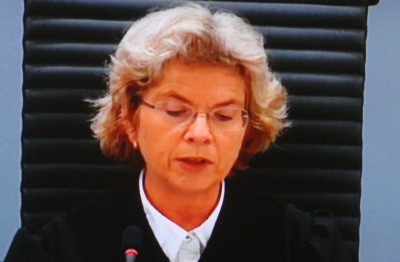Eighty percent of Norwegians questioned support the jail term handed down to confessed terrorist Anders Behring Breivik last week, and a solid majority also believe the lead judge behind it has helped restore Norwegians’ faith in their court system. Parallel opinion polls, however, indicate a majority of voters are now disenchanted with their government, and some call it an after-effect of Breivik’s attacks last year.

A public opinion poll conducted by research firm InFact for newspaper VG showed that fully 54 percent think Oslo City Court Judge Wenche Elizabeth Arntzen has saved Norwegians’ confidence in Norway’s courts. That didn’t surprise law professor Jo Stigen at the University of Oslo.
“She has mightily impressed us all,” Stigen told VG over the weekend,. “I knew from before that she was very capable and she was hand-picked for the job (to lead the five-member judicial panel hearing the case against Breivik, who killed 77 persons). She managed to conduct the case with dignity, skill and efficiency.”
Stigen was far from alone in his assessment, with several of Norway’s top legal experts also praising Arntzen for a fair and detailed verdict, while the mother of one of Breivik’s victims called the sentence “a victory for democracy and the Norwegian court system.” The court rejected the prosecution’s argument that Breivik may be suffering from mental illness and should be committed to psychiatric care, sentencing him instead to the country’s maximum jail term of 21 years with a provision that can keep him confined for life. Norway, in line with most European countries, has no death penalty.
Stoltenberg’s support sagging
As Prime Minister Jens Stoltenberg prepared to face the Norwegian Parliament on Tuesday to address criticism over the state’s emergency response to Breivik’s attacks, other opinion polls show that support for his Labour Party is lagging. Labour was Breivik’s prime target and Stoltenberg’s government has suffered greatly from the bombing of government headquarters and the deaths of friends, friends’ children and young Labour supporters during Breivik’s massacre at a Labour youth summer camp. The support and sympathy both Stoltenberg and Labour received during the period immediately after the attacks, and praise for Stoltenberg’s leadership at the time, now seems to have disappeared.

Labour slipped below 30 percent of the vote in the latest poll conducted by research firm Respons for newspaper Aftenposten, landing at 29.2 percent. The Conservative Party (Høyre), meanwhile, jumped two-and-a-half points to land at 37.6 of the vote, an historically high level.
With the even more conservative Progress Party (Fremskrittspartiet, Frp) at 12.1 percent, the two main opposition parties now hold nearly 50 percent of the vote. Høyre and Frp were the only two parties to gain voters in the poll, but with support from the other small non-socialist parties, they’d easily have a majority in Parliament.
The next national election is still a year away and Stoltenberg, keen on a third term as prime minister, is known as a tough campaigner, so the tide can turn again. The numbers, however, show some serious trends that suggest a change of government even though 70 percent of those questioned last week said they don’t think Stoltenberg and his government should resign in response to the commission’s report.
Harald Stanghelle, political commentator for newspaper Aftenposten, believes the poll results reflect the harsh criticism of Stoltenberg’s own July 22 Commission and are an effect of the debate over how the state has prepared (or failed to prepare) for such attacks. Høyre held government power just before Stoltenberg took office, though, and resisted some efforts to improve security after the terrorist attacks in the US 11 years ago. The opposition is nonetheless taking a much tougher tone against Stoltenberg now, and likely will continue to do so through the next elections.
Views and News from Norway/Nina Berglund
Please support our news service. Readers in Norway can use our donor account. Our international readers can click on our “Donate” button:

